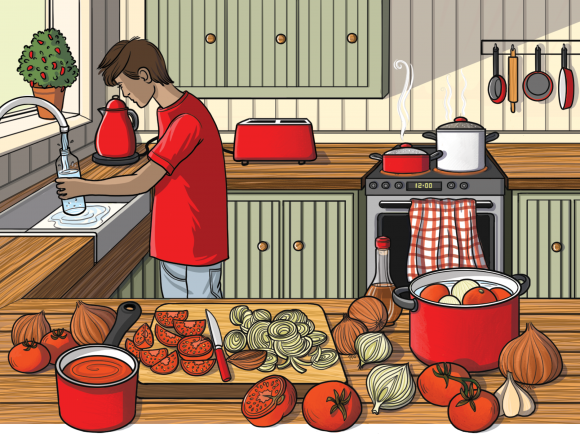When You Eat

| Growing Food, Meal Choices | Useful as climate adaptation | As emission mitigation. |
|---|---|---|
Growing fruit and vegetables at home or a shared community garden. Favour NZ-grown foods when shopping. | Diversity of fresh food sources from garden and varied retailers increases local resilience in Canterbury at times of weather disruption in food growing areas elsewhere in NZ (e.g Hawkes Bay Cyclone damage ion 2023) | Farming at scale can result in less emissions than smaller graden-scale operations, in part due to the efficient transport of food in bulk using larger vehicles. The larger impact (per kilogramme of food) is often on the car journey home from the shop. |
| Reduce Food Waste By using seasonal menus, preserving (freezing, bottling, drying) surplus crops, careful grocery purchasing, plus home composting or Council 'green bin' despatch of your scraps and garden weed. Keep food waste out of the red bin, as from there it will be landfilled and decay without oxygen causing long term emissions of methane. Useful weblink on avoiding food waste and climate aspects of food.: https://livelightly.nz/eat/ | It's cheaper to buy and process foods when plentiful 'in season'. You are better prepared for agricultural production disruptions by extreme weather here or elsewhere in NZ, by adapting cooking to enjoying seasonal variation in supply quantities and varieties. For cost comparisons of food types see this link: https://www.myeverydaywellbeing.com/advice/is-a-plant-based-diet-better-for-your-pocket/ | Avoid carbon emissions from the air freight of out-of-season food imports. Reduce methane emission by sending less waste food to decay without oxygen inside the landfill. Weblink: https://lovefoodhatewaste.co.nz |
| Increase vegetable protein proportion within diet. Adults need around 0.8g to 1g of protein per kg of body weight each day (from plant and animal sources) but often eat much more. Read about this: https://genless.govt.nz/for-everyone/everyday-life/eat-low-carbon/ | Favours NZ growing and processing of vegetable protein, demand for which may offer options for farm diversification under climate stress. (e.g. pea crops for protein require much less water per Hectare than intensive dairying for cheese) Many dietary guidelines around the world recommend limiting red meat consumption for environmental reasons. To optimize both human nutrition and planetary health, the EAT-Lancet commission (based in UK) recommends adults consume no more tan 98g a week of red meat per person, 203g of poultry, 196g fish and lower intakes of processed meat. Weblink: https://eatforum.org/lancet-commission/food-service-professionals/ | Plan-based protein production emissions are about 10x lower per kg than their commercial meat equivalents. Over time, increasing demand for plant proteins globally may help NZ reduce methane-emitting livestock numbers, creating business opportunities for plant-based protein farming. NZ research on emission impacts of different diet: |
Last updated: 04 Jun 2024